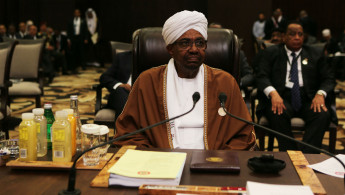Jordan loses ICC appeal over Bashir non-arrest
International appeals judges on Monday upheld a reprimand of Jordan for failing to arrest former Sudanese president Omar al-Bashir during a visit to the Arab country two years ago.
Amman had appealed a decision by the International Criminal Court which found that Jordan "failed to comply with its obligations" when it refused to detain Bashir in 2017 when he was wanted by the Hague-based tribunal to face charges of genocide, war crimes and crimes against humanity.
But the ICC's appeal judges eased the blow by reversing a pre-trial chamber judges' decision to refer Jordan to the UN Security Council and the court's Assembly of States Parties (ASP) for further measures.
Despite two international warrants for his arrest on ten charges arising from the conflict in Darfur, Bashir freely attended an Arab League summit in Amman in March 2017.
"By failing to arrest and surrender Mr. Bashir, in circumstances in which Mr. Bashir was entitled to no immunity, Jordan prevented the court from exercising an important power and a fundamental function," Judge Chile Eboe-Osuji said.
No immunity
Jordan is a member of the Rome Statute, which underpins the tribunal - established in 2002 to try the world's worst atrocities - and as such has agreed to comply with the court's orders.
In a first for the court, Amman last year appealed the ICC's findings that Jordan had failed to fulfil its legal obligations to seize Bashir, saying it was not obliged to do so.
Jordan's lawyers argued that Bashir at the time of his visit was a sitting head of state "and therefore immune to arrest", based on the international legal principle of comity between states.
But Eboe-Osuji said Monday that head-of-state immunity did not stop the ICC - an international court - from exercising its jurisdiction according to its founding document, the Rome Statute.
Easing the verdict on Jordan, however, Eboe-Osuji added that the court's pre-trial judges should not have referred the matter to the Security Council and the ASP.
"The judges' discretion to refer the case to the UNSC and ASP was tainted," Eboe-Osuji said.
Over the last decade Bashir has travelled to a number of countries who did not arrest him, including ICC member states such as South Africa and Jordan.
The 75-year-old Bashir has always denied the charges.
Bashir was toppled last month after 30 years of iron rule in Sudan, raising hopes that he would be extradited to The Hague to stand trial.
A member of Sudan's governing military council said last month that the country's next civilian government would decide whether to hand Bashir to the ICC.
"The decision whether to extradite [Bashir] to the ICC will be made by a popularly elected government and not the transitional military council," military council member Jalaluddin Sheikh told journalists during a visit to the Ethiopian capital.
The council has pledged a two-year transition period and also said it would not send Bashir or any other Sudanese citizen to the ICC.
The ICC charges against Bashir, which include a genocide allegation added in 2010, stem from a rebellion launched in Darfur in 2003.
His government's decision to unleash the armed forces and allied militia against the rebels brought him further international criticism.
Bashir was the first sitting president of a country to be wanted by the ICC, and the first person to be charged with genocide.
Without a police force, the ICC relies on member states to carry out arrest warrants against suspects.
Fugitive
Human rights groups applauded Monday's decision saying "today the ICC found that heads of state sought on charges by the court cannot be exempt from arrest".
"The decision helps to assure that victims of mass atrocities have access to justice even when the highest-level officials are implicated in the crimes," said Elise Keppler, an associate director at Human Rights Watch.
Keppler called on Bashir to be handed over to the ICC.
"Whether president or prisoner in Sudan, Omar al-Bashir remains a fugitive from the ICC on charges of the gravest crimes committed in Darfur."
"He should be surrendered to The Hague to face the charges against him," she said.
But legal experts said it seemed more likely that Bashir would be tried in Sudan, despite Sudanese opposition calls for the African nation to "immediately" join the ICC.
Sudan's deadly conflict broke out in 2003, when ethnic minority groups took up arms against Bashir's Arab-dominated government, which launched a brutal counter-insurgency.
At least 300,000 people have been killed and 2.5 million others displaced in the conflict, according to UN figures.
Follow us on Twitter: @The_NewArab





 Follow the Middle East's top stories in English at The New Arab on Google News
Follow the Middle East's top stories in English at The New Arab on Google News
![The UAE is widely suspected of arming the RSF militia [Getty]](/sites/default/files/styles/image_330x185/public/2024-11/GettyImages-472529908.jpg?h=69f2b9d0&itok=Yauw3YTG)
![Netanyahu furiously denounced the ICC [Getty]](/sites/default/files/styles/image_330x185/public/2024-11/GettyImages-2169352575.jpg?h=199d8c1f&itok=-vRiruf5)
![Both Hamas and the Palestinian Authority welcomed the ICC arrest warrants [Getty]](/sites/default/files/styles/image_330x185/public/2024-11/GettyImages-2178351173.jpg?h=199d8c1f&itok=TV858iVg)